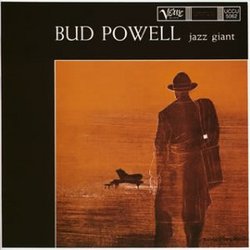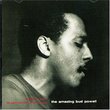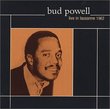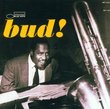| All Artists: Bud Powell Title: Jazz Giant Members Wishing: 0 Total Copies: 0 Label: Universal Japan Release Date: 5/5/2003 Album Type: Import Genres: Jazz, Pop Style: Bebop Number of Discs: 1 SwapaCD Credits: 1 |
Search - Bud Powell :: Jazz Giant
 | Bud Powell Jazz Giant Genres: Jazz, Pop
Japanese remastered reissue for the jazz piano giant, packaged in a limited edition miniature LP sleeve. Verve. 2004. |
Larger Image |
CD DetailsSynopsis
Album Description Japanese remastered reissue for the jazz piano giant, packaged in a limited edition miniature LP sleeve. Verve. 2004. Similar CDs
|
CD ReviewsA definitive collection of the master's work David Gedalecia | 07/11/2001 (5 out of 5 stars) "This collection of tracks, as much as any other, captures Bud Powell at the top of his form. Powell was the overlooked equal of Parker in terms of sheer musical importance and artistry, and pianistically more than a match for Art Tatum. These early Verves are sublime, almost inhumanly so." There's a much better alternative to "Jazz Giant" Ben Nevis | 09/20/2008 (1 out of 5 stars) "Anyone interested in "Jazz Giant" would be far better off with the less expensive Bud Powell "Complete 1947-1951 Blue Note, Verve & Roost Sessions" compilation instead. And here's why: 1. The Blue Note/Verve/Roost compilation contains exactly the same material as "Jazz Giant" with the same personnel from the same recording sessions (trio sessions with Powell, Ray Brown & Max Roach in 1949; and BP, Curly Russell & Roach in 1950). 2. "Jazz Giant" contains only 13 tracks. The Blue Note/Verve/Roost compilation contains 45 tracks. 3. The sound quality on the BN/V/R compilation is surprisingly bright, clean and present (a 24 bit remastering), especially considering the fact that these recordings were made some sixty year ago. 4. The BN/V/R compilation cost me six dollars less than the amazon price for "Jazz Giant." On top of all this, the BN/V/R compilation, a 2-CD Spanish import (from the Jazz Factory), apparently includes all of Bud Powell's trio studio sessions for Blue Note, Verve and Roost from 1947 to 1951, as well as all of his stunning solo work: "Parisian Thoroughfare," "Oblivion," "Dusk in Sandi," "Hallucinations," "The Fruit," "A Nightingale Sang in Berkeley Square," Just One of Those Things," and "The Last Time I saw Paris." These eight solo pieces alone would make the BN/V/R complilation worthwhile, but the additional 37 trio tracks (especially the 13 tracks also included on "Jazz Giant") make it an obvious choice. Of the two dozen trio pieces included on the Blue Note/Verve/Roost compilation, but not included on "Jazz Giant," there are quite a few I wouldn't want to do without, especially the Powell originals "Bud's Bubble," "Un Poco Loco" (three takes), and my personal favorite "Parisian Thoroughfare" (in both solo and trio sessions), not to mention Monk's "Off Minor," as well as two takes of "Ornithology." One very minor complaint (or maybe it's really more of a lament): the trio session of "Parisian Thoroughfare" ends abruptly when someone (perhaps Powell himself) simply says: "Hey, cut it, man." But at least there's 3:27 of this brilliant rendition of one of the great BP originals. One last thing (especially for those unable to locate the 2-CD set described above): As of this writing (Sept 2008), the "Complete 1947-1951 Blue Note, Verve & Roost Sessions" is incorrectly listed at amazon as the "Complete Blue Note and Verve [IMPORT]." " Tempus Fugit and So Does Bud David Gedalecia | Wooster, OH USA | 04/19/2004 (5 out of 5 stars) "It would be difficult indeed to think of a jazz piano tune as exciting as the principal track on this CD, "Tempus Fugue-it." If there was ever any doubt in anyone's mind about Bud Powell's position in the jazz piano pantheon, this track should clear that up. It is simply a perpetual motion cascade of ideas presented with crystal clarity. It is as stirring a performance by a jazz pianist as you will ever hear. As an observation, compare the track with Horace Silver's "Safari," also a magnificently moving solo piece, on his first Blue Note album, "The Horace Silver Trio," which captures a similar mood through a different approach, that is part barrelhouse, part Bud. In the end, Bud was, and is, the man!"
|

 Track Listings (13) - Disc #1
Track Listings (13) - Disc #1


